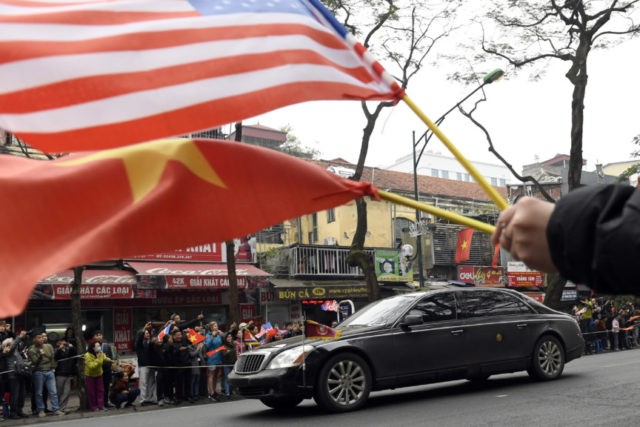With the second summit on February 27-28 between President Donald Trump and North Korean dictator Kim Jong Un – this time in Vietnam – the question to be asked is: Who holds the high ground when the two leaders negotiate the issue of Pyongyang terminating its nuclear and missile programs?
There should be little doubt North Korea will do whatever it can to retain its programs as, for Kim, these are important bragging rights with his military. In dealing with his Trump “problem,” we can expect Kim to employ “tricks of the trade” utilized by Iran’s mullahs in negotiating their nuclear deal – one heavily slanted in their favor as a result under President Barack Obama.
The nuclear deal proved to be a goldmine for Tehran, allowing it to deceive the West on its compliance. This was an obvious outcome of a deal that even outrageously permitted Iran to inspect itself to ensure compliance.
Any effort by Kim to discuss a deal ending his nuclear program would be undertaken in a similar vein as undertaken by the Iranians–whose program is still active. Kim will only want an agreement heavily weighted in his favor as well and, like the mullahs, will promise to do that which he has no intention of doing to achieve it.
Kim is already on record saying he wants an Iran-like deal. Thus, Trump will have his hands full trying, unlike Obama, not to negotiate a similar one-sided agreement. In giving away so much to Iran earlier, Obama’s negotiators, unfortunately, leave Trump’s negotiators in a difficult bargaining position. And Kim will take anything less than an Iran deal as a slap in the face.
Trump and Kim will enter their second meeting with two different negotiating strengths.
On September 2, 2018, Pyongyang tested a thermonuclear weapon, boasting it could fit the new device on an advanced intercontinental missile (ICBM). Soon thereafter, South Korean intelligence reported the North was moving an ICBM in preparation for another test launch over the northern Pacific and possibly Japan.
Not to be intimidated, Trump gave the order to the U.S. military to shoot down and destroy any North Korean missile headed toward the continental U.S., Hawaii, or Guam.
Trump’s response to Kim’s boastful challenge was necessary for dealing with a dictator used to intimidating others. While it may well have given Kim pause to consider the fact Trump was no Obama push-over, five months later, Trump made an ill-advised statement that undercut this strength, undoubtedly encouraging the North Korean dictator to play hardball during the upcoming summit meeting.
The unsolicited statement by Trump was made as envoys from both sides met to discuss the parameters of the second meeting. Trump said, while he sought Pyongyang’s de-nuclearization, he was “in no rush” to accomplish it. Kim obviously saw this comment as giving him some breathing room. This is important to the delaying tactics Kim can be expected to employ as he seeks to wait out a Trump presidency, hoping it is just one term but prepared to employ further delays should it go for two terms.
Additional encouragement for Kim to delay is the domestic opposition against Trump. Kim has observed Democrats put much more importance on party politics than on America’s national security, ignoring the later to focus on impeaching Trump as the threat.
For eight years under the Obama Administration, our national security suffered as enemies like Iran and North Korea advanced their interests due to our having elected a president who was simply incapable of understanding the threat. While we now have a president who understands it, those enemies are still able to make headway because we have an opposition party failing to understand it. As such, we really cannot expect too much substance to come out of the Trump/Kim summit.
Sadly, we have met the greatest threat to our national security and it is us!
Lt. Colonel James G. Zumwalt, USMC (Ret.), is a retired Marine infantry officer who served in the Vietnam war, the U.S. invasion of Panama and the first Gulf war. He is the author of “Bare Feet, Iron Will–Stories from the Other Side of Vietnam’s Battlefields,” “Living the Juche Lie: North Korea’s Kim Dynasty” and “Doomsday: Iran–The Clock is Ticking.” He frequently writes on foreign policy and defense issues.

COMMENTS
Please let us know if you're having issues with commenting.